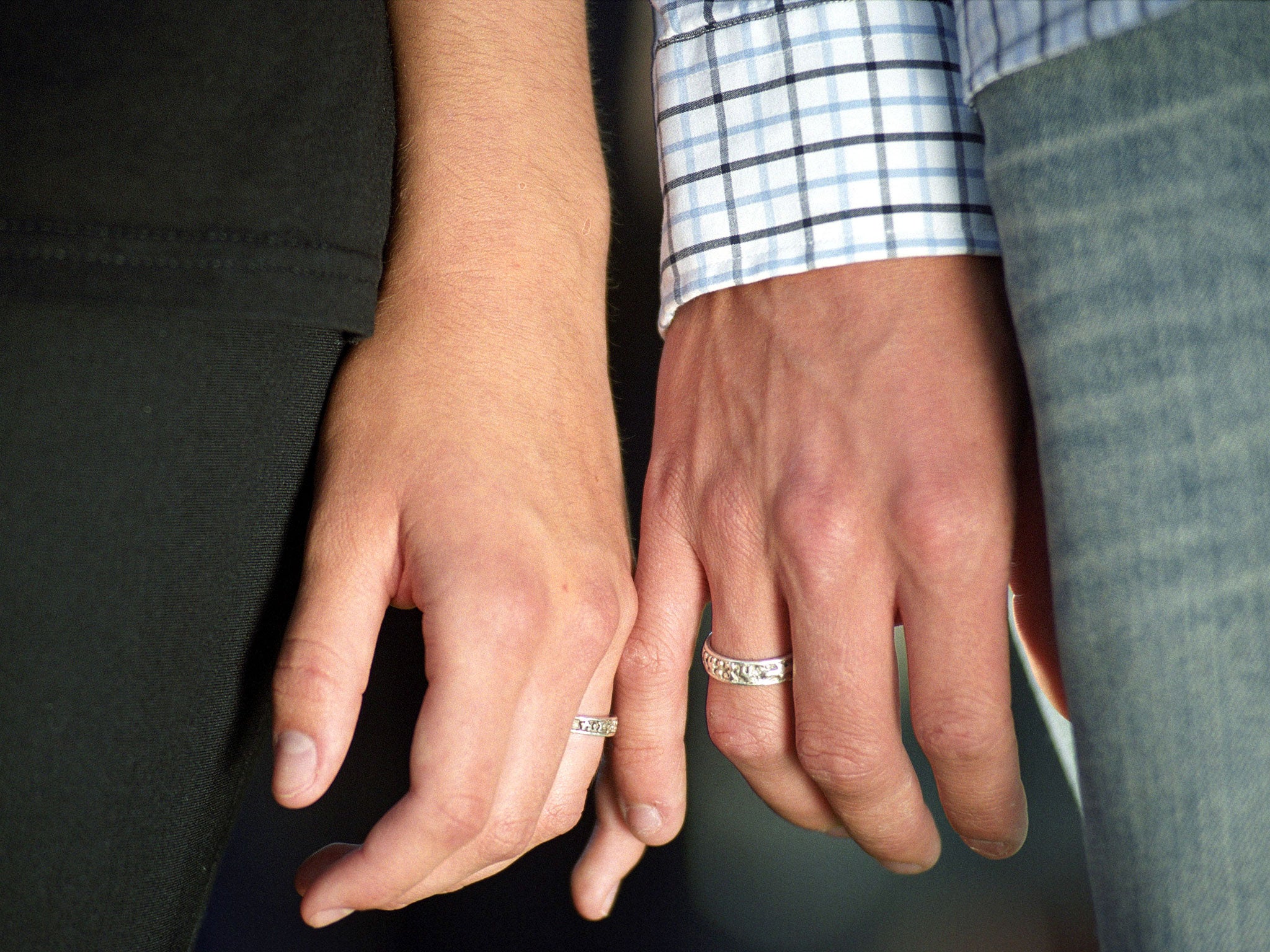The recipe for a great marriage has changed: Couples must help one another 'discover inner potential'
Partners now looking for more than just sharing a home, according to psychologists

A marriage is supposed to be made in heaven but if it is to work in the 21st Century it has to allow both partners to discover their inner potential rather than being merely an institution for living together and raising children, a study has found.
The best marriages are probably better today than at any time in history because spouses are looking for something other than simply sharing the same home, a goal which would have been perfectly acceptable a century or more ago, psychologists said.
Marriage has effectively gone through three ages of development over the past three centuries and although divorce rates have never been higher, so has the personal fulfillment of sharing your life with a partner, they said.
In contemporary marriages, people are looking to “find themselves” and to pursue interesting careers and other aspects of their lives that allow them to express their “inner core”, said Professor Eli Finkel of Northwestern University in Evanston, Illinois, who carried out a review of previous research into marriage.
The issue is not about that people today are expecting more from their marriages, it’s that the nature of what they are expecting has changed, Professor Finkel told the American Association for the Advancement of Science in Chicago.
“They're asking less of their marriage regarding basic physiological and safety needs, but they're asking more of their marriage regarding higher psychological needs like the need for personal growth,” Professor Finkel said.
“In 1800, the idea of marrying for love was ludicrous. That isn't to say that people didn't want love from their marriage; it just wasn't the point of marriage,” he said.
“In contemporary marriages, Americans look to their marriage to help them 'find themselves' and to pursue careers and other activities that facilitate the expression of their core self,” he told the meeting.
In the transition from a rural economy to an industrial society, countries like the US and Britain saw a move away from the original idea of marriage being an institution that helped to provide basic functions such as food, shelter and physical safety. Instead, the urban idea of man as the bread-winner and woman as the home-maker came to the fore, Professor Finkel explained.
“To be sure, marriage remained an economic institution, but the fundamental reason for getting married and for achieving happiness within the marriage increasingly revolved around love and companionship,” he said.
Then came the counterculture of the 1960s when the third model of marriage emerged. This valued love and companionship, and helping your spouse to engage in a voyage of self-discovery and personal growth.
This change in what was expected from marriage meant that to be successful, each partner had to develop the necessary insights to know what their spouse needed and how to help them to achieve it. This was more subtle and complex than what was needed in the past for a happy marriage.
“The best marriages today are better than the best marriages of yesteryear. But the problem is, it's harder.... it requires a great deal more of the marital bond per se to achieve those higher psychological needs than to achieve the lower needs of the past,” he said.
"However, developing such insight requires a heavy investment of time and psychological resources in the marriage, not to mention strong relationship skills and interpersonal compatibility," he added.
Divorce rates are high and marital satisfaction in those relationships that survive are not as high as they once were because most spouses are simply not putting in the amount of time and psychological investment needed to help each other’s love and self-expression, he told the meeting.
This is not helped by the fact that in the modern world, many married people are spending less time with their partners than several decades ago, partly as a result of the long-hours work culture, he said.
“In 1800 you didn't have to have profound insight into your partner's core essence to tend the chickens properly or build a sound physical structure to keep out the snow. In contrast, in 2014, you are really hoping that your partner can help you on your voyage of self-discovery and personal growth.
“Your partner can't do that unless he or she really knows who you are, and really understands you. That requires much greater investment of time and psychological resources in the quality of the relationship per se,” he said.
Subscribe to Independent Premium to bookmark this article
Want to bookmark your favourite articles and stories to read or reference later? Start your Independent Premium subscription today.

Join our commenting forum
Join thought-provoking conversations, follow other Independent readers and see their replies